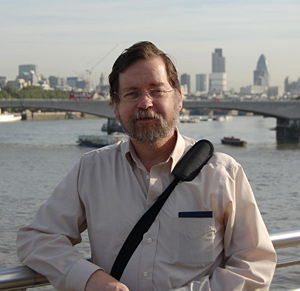 Image via Wikipedia
Image via Wikipedia
But in a debate about the compatibility of science and religion, we have to put the argument in an appropriate context and define a specific shared purpose for both science and religion — it's the only legitimate ground for discussion. In this case, what we're trying to do is address big questions (remember, the Templeton Foundation says they're all about those "big questions") about the nature of the universe, about our history, about how we function, and then we encounter a conflict: religion keeps giving us different answers. Very different answers. They can't all be right, and since no two religions give the same answers, but since science can generally converge on similar and consistent answers, I know which one is right. And that makes religion simply wrong.Ah, that is so satisfying to see someone with READERS say "religion is simply wrong". Stephen Jay Gould tried to be nice to religion and called it nonoverlapping magisteria (NOMA). Essentially trying to say that science and religion operated in very different realms and therefore could not be judged the same way. That science was about reality while religion was philosophy. This would be fine if religion stayed over in it's designated territory but it never, ever has, Christianity has even attempted to do science using the bible, which is how we get a 6,000 year old Earth. Gould's idea is so obviously wrong I always thought it was just a desperate attempt to placate the theists. PZ attacks the different methods:
We have to look at what they do to see why. In order to probe the nature of the universe around us, science is a process, a body of tools, that has a long history of success in giving us robust, consistent answers. We use observation, experiment, critical analysis, and repeated reevaluation and confirmation of events in the natural world. It works. We use frequent internal cross-checking of results to get an answer, and we never entirely trust our answers, so we keep pushing harder at them. We also evaluate our success by whether the end results work: it's how we end up with lasers and microwave ovens, and antibiotics and cancer therapies.To put it simply, science is self-correcting. There are a number of excellent methodologies (which PZ outlines briefly above) that are employed in the self-correcting process. Over time various hypothesizes converge in the closest thing we humans have to truth. I've often said this is the difference between science and religion; over time science converges from splinters to solidity, while religion is the opposite, it simply keeps splintering more and more. Look at all the sects of any one religion, this is because all that is needed in religion is a charismatic leader and you have a whole new set of answers and there is no way at all to check anyone's answers.
Religion, on the other hand, uses a different body of techniques to explain the nature of the universe. It uses tradition and dogma and authority and revelation, and a detailed legalistic analysis of source texts, to dictate what the nature of reality should be. It's always wrong, from an empirical perspective, although I do have to credit theologians with some of the most amazingly intricate logical exercises as they try to justify their conclusions. The end result of all of this kind of clever wankery, though, is that some people say the world is 6000 years old, that it was inundated with a global flood 4000 years ago, and other people say something completely different, and there is no way within the body of theology to resolve which answers are right."Religion uses a different body of techniques" - oh the depth of meaning over that one. Their methodologies are crap and never yeild any accurate answers about the nature of reality. They end up with ridiculous conclusions, the Earth being 6,000 years old is a favorite to look at because it is SO absurd and so easily demolished. But the hard core fundies can't say that their religion is wrong and science is right so they start making up things to make it seem like science is crap, the end result of this is an American society that is frightfully ignorant of even the basic scientific answers about the world. Or about the basics on how science finds answers.
I love that PZ talked about this in detail - and I highly recommend following the link and reading the entire posting - because he has a lot of readers and this message will reach many people. Unfortunately he is probably preaching to the choir for the most part, but I'm sure there is a fair number sitting on the fence, trying to make up their minds. PZ gives them some tools to work with for judging things.
If religion stayed in it's own territory along the lines of Gould's NOMA I would have no complaints about it. But when it ventures into sciences realm it needs to be prepare to defend itself.
![Reblog this post [with Zemanta]](http://img.zemanta.com/reblog_a.png?x-id=0dba79e5-fc04-42d5-8286-e2c01220bc49)
2 comments:
As someone who has read you for years, PZ sounds just like you always have.
Susan
Thanks, no wonder I like him!
Post a Comment